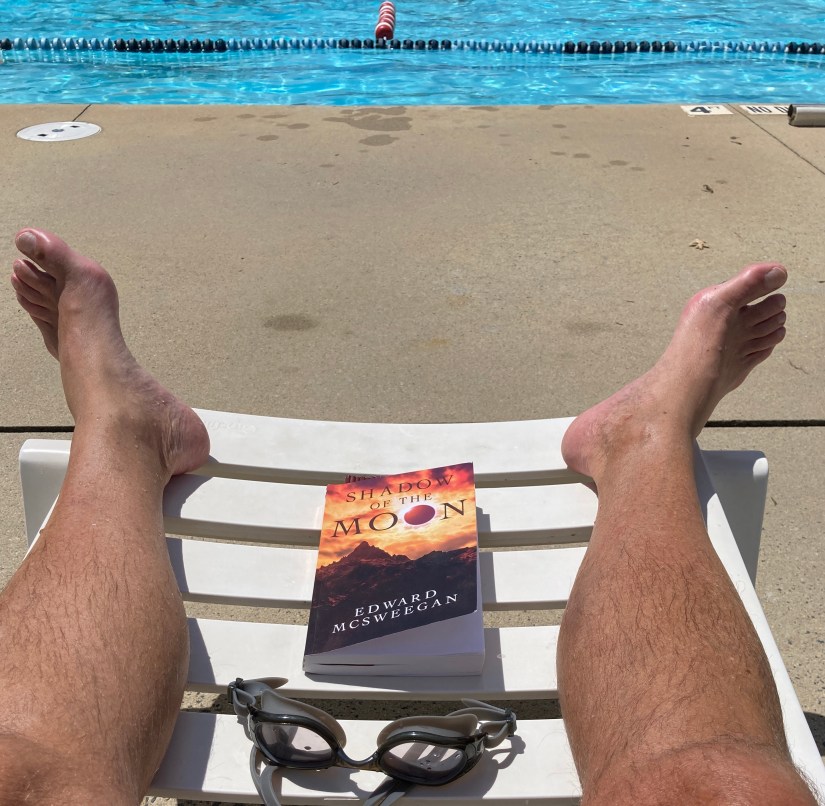I was at the Maryland Writers Association annual conference last weekend. A chance to see old friends and sell some books. No one ask how many books I sold.

Edward McSweegan
I was at the Maryland Writers Association annual conference last weekend. A chance to see old friends and sell some books. No one ask how many books I sold.


A taste of the rough and tumble, gun-toting Old West with a sprinkle of romance create just the right blend of adventure and suspense amid scientific discovery. A highly recommended read! https://tinyurl.com/4wp4388e
A nice review from GoodReads. I heard two book clubs–one in CT and one in RI–are reading the book. Hope that’s true.

“I just finished reading “Shadow Of The Moon” and must say that it was an interesting read. I had a tough time starting it, likely due to knowing the author and I found I was constantly asking, “Where did that come from?” You had to have done some quite voluminous research for this one.
That said, the further I got into it, the more I became invested in the story and the characters. You touched on so many things other than the science – the geography of the area at that time, the dress of the characters, the women’s suffrage movement and the general treatment of women (especially female scientists), the competition of the railway companies, and on, and on.
I read late into the night last night and finished up at the pool today (greatly reducing my time in the water). As with all good literature, I found my reading pace quickening as I read further into the book, wondering from about 100 pages to go, how will he end it? What will become of everyone?
…you ended with a wonderful section of author’s notes which I not only found fascinating; but it also piqued my curiosity – I shall be doing some character googling later tonight.”

I just signed a contract for my second novel, The Cottage Industry. What’s it about?
It’s 1922. David Enders, a pilot for the French Army during the war, returns to Connecticut. He’s been wandering post-war France as a nervous pilot: a term the army uses to distinguish airmen from the mass of shell-shocked soldiers who fought in the trenches. Now he’s home to contend with a difficult father, a sister locked in a mysterious post-influenza coma, and a volatile country still in the grips of wartime paranoia and civil liberty restrictions.
He finds work with a real estate company building private beach homes along the coast—the effect of which will be to close off the shoreline to all but a few lucky middle-class buyers. The company’s private beaches are restricted to “true Americans,” and those property restrictions force Enders into awkward encounters with ethnic families and the NAACP.
He’s working in Old Lyme. It’s a summertime town of bootleggers, rum runners, flappers, clammers, crooked deputies, and the famous Old Lyme Art Colony whose impressionist painters don’t want their bucolic landscapes marred by cookie-cutter cottages. Here, Enders doesn’t so much reinvent himself as rebuild himself. He starts flying again only to be shot at by rum runners. He falls in love with a young artist—Karen Bates—only to have a bent cop threaten her with wartime public health laws. Lost liberties and personal secrets test Enders’ still fragile character. He and Karen are two people surrounded by suffocating customs and illiberal laws. They’re looking for an escape.


So, a friend of mine read my book, Shadow of the Moon, and decided to post a review of it. But rather than write it herself, she had an AI do it. She dropped in a few key words and out popped a brief, complimentary review. I guess that spells the doom of book reviewers.
An Author I Admire…
The title of Edward McSweegan’s mesmerizing novel, Shadow of the Moon (Wild Rose Press, 2023), refers to the total eclipse of the sun in July 1878.
From Susan’s periodic newsletter. See her website, and her own novel, Of Better Blood.
Edgewater, Maryland. With members of the Monday night critique group and some of the fiction-writing class at AACC.EDU. Tremendous thanks to Susan Moger for setting this up.



A nice review of Shadow of the Moon from the Historical Fiction Company. Maybe a little too much emphasis on the wild west aspects and not enough about the actual 1878 solar eclipse, but who’s complaining.
